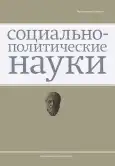Россия 2020-х гг.: Индустрия 4.0 и вопросы устойчивого развития
- Авторы: Курюкин А.Н.1
-
Учреждения:
- Институт социологии Федерального научно-исследовательского социологического центра Российской академии наук
- Выпуск: Том 13, № 4 (2023)
- Страницы: 65-73
- Раздел: Государственная и отраслевая политика
- URL: https://journal-vniispk.ru/2223-0092/article/view/145500
- DOI: https://doi.org/10.33693/2223-0092-2023-13-4-65-73
- ID: 145500
Цитировать
Аннотация
В статье автор рассматривает вопрос соотношения интеграции инноваций, объединяемых понятием, Индустрия 4.0 и концепта устойчивого развития, который в современных условиях цивилизационной турбулентности продолжают оставаться на переднем плане. Взяв за основу базовые составляющие парадигмы устойчивого развития – экономику, социум и экологию, автор проводит рассмотрение воздействия на них базовых инноваций, сгенерированных на технологиях, составляющих сущность Индустрии 4.0 – большие данные, искусственный интеллект, Интернет вещей, Интернет сервисов, киберфизические системы. Результаты анализа показывают, что базовых сценариев, которые могут быть сформированы на основе научного дискурса, в конечном итоге – два: оптимистический, сторонники которого стремятся видеть только позитивные черты ускорения развития экономики и социума современной цивилизации, благодаря внедрению инноваций и пессимистический, сторонники которого указывают на вероятности социальных и экологических потрясений, которые могут выразиться в существенной, а возможно и практически полной перестройке современной социальной реальности, приведя к исчезновению целых профессий, переходу огромных масс населения на мировом уровне за черту бедности, коренной трансформации практик социального взаимодействия и «ткани» социальной действительности вообще. Автор же выступает за так называемый взвешенный подход, который и применен в этой работе.
Ключевые слова
Полный текст
Открыть статью на сайте журналаОб авторах
Андрей Николаевич Курюкин
Институт социологии Федерального научно-исследовательского социологического центра Российской академии наук
Автор, ответственный за переписку.
Email: kuriukin@inbox.ru
ORCID iD: 0000-0002-9572-3070
кандидат политических наук, старший научный сотрудник
Россия, г. МоскваСписок литературы
- Курюкин А.Н. Россия 2020-х: экономика и право перед вызовами Индустрии 4.0 // Проблемы экономики и юридической практики. 2022. Т. 18. № 4. С. 162–168. doi: 10.33693/2541-8025-2022-18-4-162-168.
- Ajwani-Ramchandani R., Figueira S., Torres de Oliveira R., Jha S. Enhancing the circular and modified linear economy: The importance of blockchain for developing economies // Resour. Conserv. Recycl. 2021. No. 168. Pp. 105–118.
- Bai C., Dallasega P., Orzes G., Sarkis J. Industry 4.0 technologies assessment: A sustainability perspective // Int. J. Prod. Econ. 2020. No. 229. Pp. 107–116.
- Bonilla S.H., Silva H.R., Terra da Silva M. et al. Industry 4.0 and sustainability implications: A scenario-based analysis of the impacts and challenges // Sustainability. 2018. No. 10 (10). Pp. 37–49.
- Borowski P.F. Digitization, digital twins, blockchain, and industry 4.0 as elements of management process in enterprises in the energy sector // Energies. 2021. No. 14 (7). Pp. 78–85.
- Ching N.T., Ghobakhloo M., Iranmanesh M. et al. Industry 4.0 applications for sustainable manufacturing: A systematic literature review and a roadmap to sustainable development // J. Clean. Prod. 2022. Pp. 113–133.
- Costa J., Matias J.C. Open innovation 4.0 as an enhancer of sustainable innovation ecosystems // Sustainability. 2020. No. 12 (19). Pp. 81–92.
- Kahn K.B. Understanding innovation // Bus. Horiz. 2018. No. 61 (3). Pp. 453–460.
- Khan I.S., Ahmad M.O., Majava J. Industry 4.0 and sustainable development: a systematic mapping of triple bottom line, circular economy and sustainable business models perspectives // J. Clean. Prod. 2021. No. 297. Pp. 126–155.
- Kurniawan T.A., Othman M.H.D., Hwang G.H., Gikas P. Unlocking digital technologies for waste recycling in Industry 4.0 era: A transformation towards a digitalization-based circular economy in Indonesia // J. Clean. Prod. 2022. No. 357. Pp. 131–141.
- Lee C.C., Qin S., Li Y. Does industrial robot application promote green technology innovation in the manufacturing industry? // Technol. Forecast. Soc. Change. 2022. No. 183. Pp. 121–133.
- Ondov M., Rosova A., Sofranko M. et al. Redesigning the production process using simulation for sustainable development of the enterprise // Sustainability. 2022. No. 14 (3). Pp. 15–24.
- Park J., Bae H. Big data and AI for process innovation in the industry 4.0 era // Appl. Sci. 2022. No. 12 (13). Pp. 63–76.
- Priarone P.C., Campatelli G., Catalano A.R., Baffa F. Life-cycle energy and carbon saving potential of Wire Arc Additive Manufacturing for the repair of mold inserts // CIRP J. Manufac. Sci. Technol. 2021. No. 35. Pp. 943–958.
- Ramadan M., Amer T., Salah B., Ruzayqat M. The impact of integration of Industry 4.0 and internal organizational forces on sustaining competitive advantages and achieving strategic objectives // Sustainability. 2022. No. 14 (10). Pp. 41–58.
Дополнительные файлы








